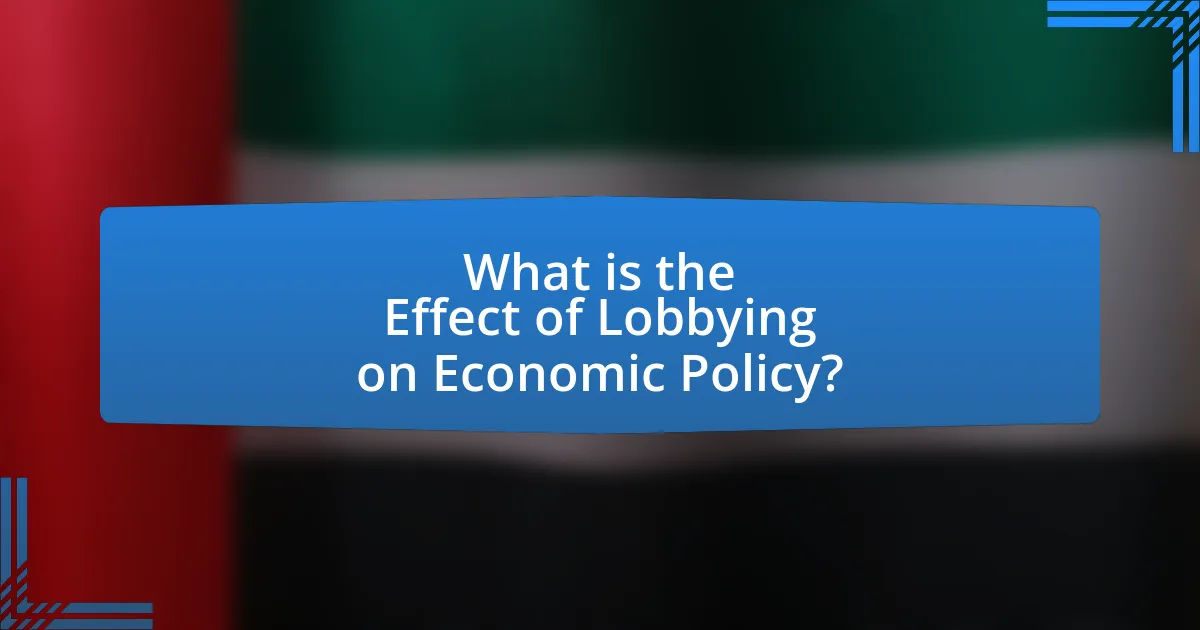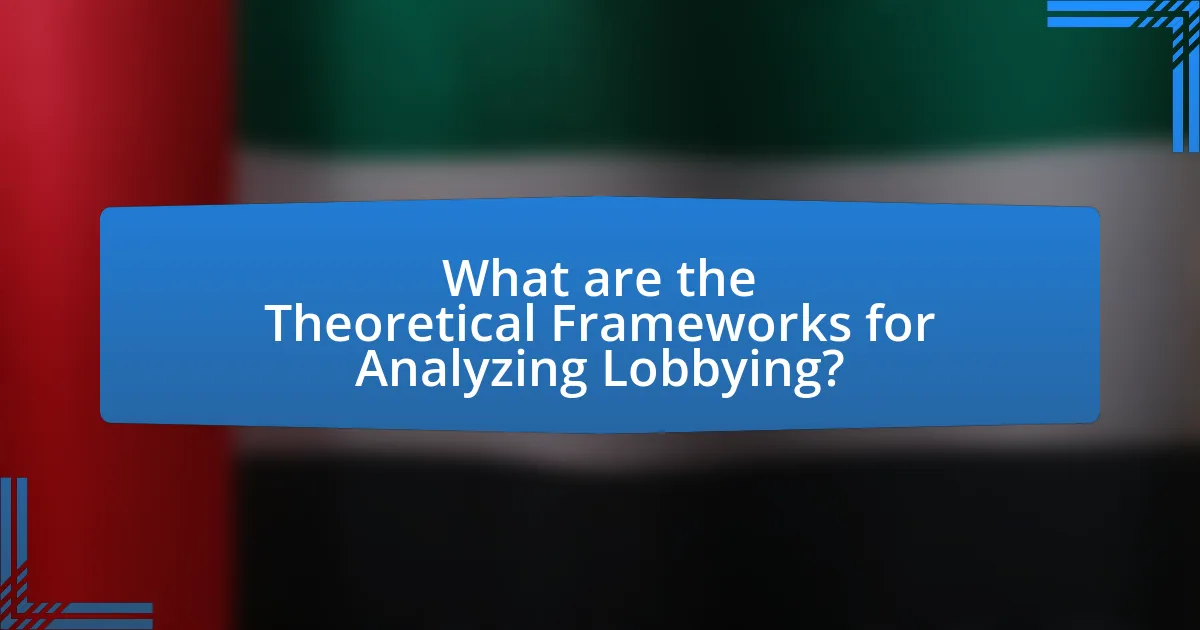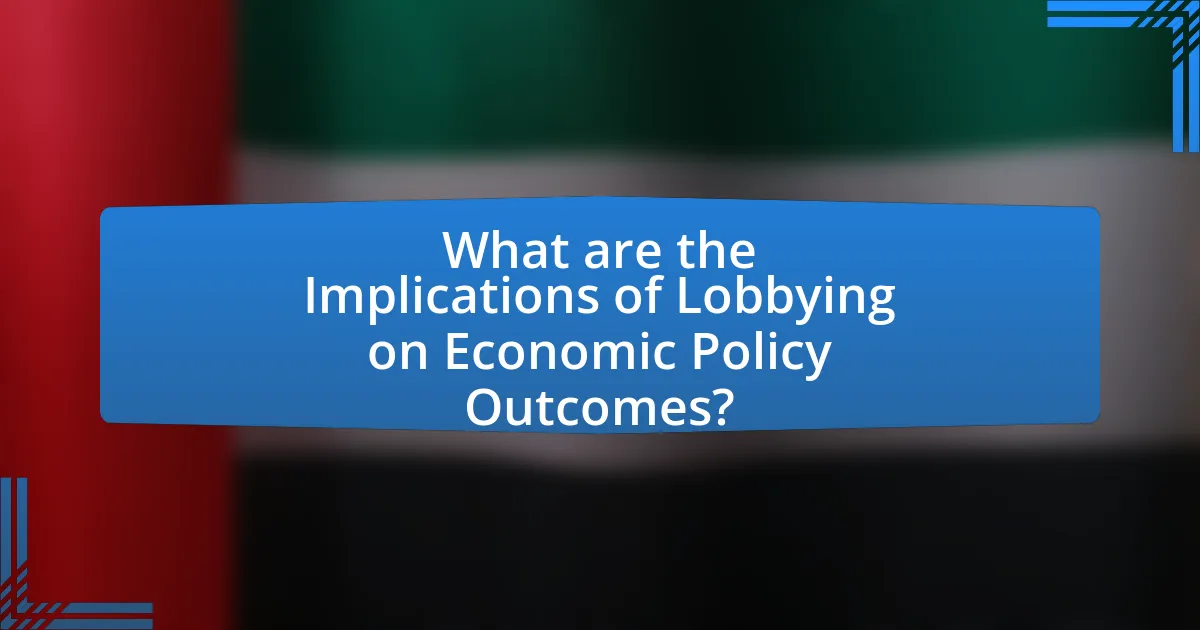The article examines the significant impact of lobbying on economic policy, highlighting how lobbyists shape legislation and regulatory frameworks to favor specific interests, often at the expense of broader public welfare. It discusses the mechanisms through which lobbying operates, including direct communication, grassroots mobilization, and financial contributions, and analyzes how different types of lobbying influence policy outcomes. The article also explores the implications of lobbying on economic equity and fairness, the theoretical frameworks for understanding lobbying, and the regulatory environments governing lobbying activities. Additionally, it addresses the potential benefits and drawbacks of lobbying, emphasizing the need for transparency and accountability to mitigate negative effects on economic policy.

What is the Effect of Lobbying on Economic Policy?
Lobbying significantly influences economic policy by shaping legislation and regulatory frameworks to favor specific interests. This occurs as lobbyists advocate for policies that benefit their clients, often resulting in the allocation of resources and benefits that align with those interests. For instance, research by the Center for Responsive Politics indicates that industries such as pharmaceuticals and finance spend billions annually on lobbying efforts, which can lead to favorable tax breaks, subsidies, or regulatory exemptions. Consequently, the economic policies enacted may prioritize the interests of well-funded lobbyists over broader public welfare, illustrating the profound impact of lobbying on the economic landscape.
How does lobbying influence economic decision-making?
Lobbying influences economic decision-making by shaping policies and regulations that affect market conditions and business operations. Through financial contributions, advocacy, and information dissemination, lobbyists can sway legislators and government officials to favor specific economic interests. For instance, a study by the Center for Responsive Politics found that in 2020, the pharmaceutical industry spent over $300 million on lobbying efforts, which directly impacted drug pricing policies and patent laws. This demonstrates how lobbying can lead to favorable economic outcomes for certain sectors while potentially disadvantaging others, thereby altering the overall economic landscape.
What are the mechanisms through which lobbying operates?
Lobbying operates through several mechanisms, primarily including direct communication, grassroots mobilization, and financial contributions. Direct communication involves lobbyists meeting with policymakers to advocate for specific legislation or regulations, often providing data and research to support their positions. Grassroots mobilization engages the public to influence policymakers by demonstrating widespread support or opposition to an issue, often through campaigns that encourage constituents to contact their representatives. Financial contributions, such as donations to political campaigns or political action committees, can also sway policymakers by creating a sense of obligation or favor towards the interests of the contributors. These mechanisms are supported by evidence showing that lobbying efforts can significantly impact legislative outcomes, as seen in studies indicating that industries with higher lobbying expenditures often achieve more favorable regulatory environments.
How do different types of lobbying affect policy outcomes?
Different types of lobbying significantly influence policy outcomes by shaping legislative agendas, altering public opinion, and affecting decision-making processes. For instance, direct lobbying, where lobbyists engage with lawmakers to advocate for specific legislation, often results in favorable policy changes, as seen in the passage of the Affordable Care Act, which was heavily influenced by healthcare lobbyists. In contrast, grassroots lobbying mobilizes public support to pressure policymakers, exemplified by environmental groups successfully advocating for climate change legislation through widespread public campaigns. Research indicates that the financial resources and strategic approaches employed by various lobbying groups can lead to disproportionate representation of interests, ultimately skewing policy outcomes in favor of those with greater lobbying power, as highlighted in studies by the Center for Responsive Politics.
Why is understanding lobbying important for economic policy?
Understanding lobbying is crucial for economic policy because it significantly influences legislative outcomes and resource allocation. Lobbying shapes the interests and priorities of policymakers, often leading to regulations and laws that favor specific industries or groups. For instance, research by the Center for Responsive Politics indicates that in 2020, over $3.5 billion was spent on lobbying in the United States, demonstrating its pervasive role in shaping economic policies. This financial influence can lead to policies that may not align with the broader public interest, highlighting the need for transparency and accountability in lobbying practices.
What role does lobbying play in shaping public policy?
Lobbying plays a crucial role in shaping public policy by influencing lawmakers and government officials to adopt specific legislative agendas that align with the interests of various stakeholders. Through direct communication, financial contributions, and mobilization of public opinion, lobbyists provide information and perspectives that can sway decision-making processes. For instance, the American Political Science Association has documented that lobbying efforts can significantly impact policy outcomes, as seen in the passage of the Affordable Care Act, where healthcare lobbyists played a pivotal role in shaping the legislation. This demonstrates that lobbying is not merely an ancillary activity but a fundamental component of the policy-making process, often determining which issues gain traction and how they are addressed in legislation.
How does lobbying impact economic equity and fairness?
Lobbying significantly impacts economic equity and fairness by allowing powerful interest groups to influence policy decisions in their favor, often at the expense of broader societal interests. This influence can lead to the creation of laws and regulations that disproportionately benefit wealthy individuals and corporations, thereby exacerbating income inequality. For instance, research by the Center for Responsive Politics shows that industries with substantial lobbying expenditures, such as finance and pharmaceuticals, often secure favorable legislation that enhances their profits while neglecting the needs of lower-income populations. Consequently, the disparity in political influence results in economic policies that favor the affluent, undermining fairness and equity in the economic system.

What are the Theoretical Frameworks for Analyzing Lobbying?
Theoretical frameworks for analyzing lobbying include the pluralist theory, elite theory, and the rational choice theory. Pluralist theory posits that lobbying is a natural part of democracy where various interest groups compete for influence, suggesting that this competition leads to balanced policy outcomes. Elite theory, on the other hand, argues that a small group of elites holds disproportionate power, thereby skewing policy decisions in favor of their interests. Rational choice theory focuses on the strategic behavior of individuals and organizations, emphasizing that lobbyists act to maximize their benefits while minimizing costs, which can lead to policy outcomes that reflect their interests. These frameworks provide a structured approach to understanding the dynamics of lobbying and its impact on economic policy.
What political theories explain the role of lobbying in economic policy?
Political theories that explain the role of lobbying in economic policy include pluralism, elite theory, and public choice theory. Pluralism posits that lobbying is a natural outcome of a democratic society where multiple interest groups compete for influence, leading to policies that reflect a balance of interests. Elite theory, on the other hand, argues that a small group of elites, often with significant resources, dominate the lobbying process, shaping economic policy to benefit their interests. Public choice theory suggests that lobbying is a form of collective action where individuals or groups seek to influence policymakers for economic gain, often resulting in policies that may not align with the public interest. These theories collectively illustrate the complex dynamics of lobbying and its impact on economic policy formulation.
How does pluralism view the influence of lobbying?
Pluralism views the influence of lobbying as a necessary mechanism for representing diverse interests within a democratic society. This perspective posits that lobbying allows various groups, including businesses, labor unions, and advocacy organizations, to compete for attention and resources from policymakers, thereby ensuring that multiple voices are heard in the decision-making process. Research indicates that pluralism promotes the idea that this competition among interest groups leads to more balanced and representative policy outcomes, as seen in the work of political scientists like David Truman, who argued that interest groups play a crucial role in the political landscape by mobilizing citizens and influencing legislation.
What insights does elite theory provide regarding lobbying?
Elite theory posits that a small, cohesive group of elites holds significant power and influence over political decisions, including lobbying efforts. This theory suggests that lobbying is primarily conducted by these elites to protect their interests and maintain their status, often at the expense of broader democratic engagement. Evidence supporting this includes the concentration of lobbying resources among a few powerful organizations and individuals, which can shape policy outcomes in favor of elite interests rather than the general public. For instance, research indicates that industries with greater financial resources tend to have more effective lobbying efforts, leading to policies that reflect their priorities.
How do institutional frameworks affect lobbying practices?
Institutional frameworks significantly shape lobbying practices by establishing the rules, norms, and structures that govern interactions between interest groups and policymakers. These frameworks determine the accessibility of decision-makers, the transparency of lobbying activities, and the regulatory environment in which lobbying occurs. For instance, countries with stringent lobbying regulations, such as Canada, require lobbyists to register and disclose their activities, which can limit the influence of less transparent lobbying efforts. Conversely, in systems with weaker regulations, such as the United States, lobbying can be more pervasive and less accountable, leading to greater potential for undue influence on economic policy. Research by the European Parliament in 2019 highlights that institutional settings directly impact the effectiveness and strategies of lobbying, demonstrating that the design of political institutions can either facilitate or hinder the lobbying process.
What are the regulatory environments governing lobbying activities?
The regulatory environments governing lobbying activities include federal, state, and local laws that establish rules for transparency, registration, and reporting of lobbying efforts. At the federal level in the United States, the Lobbying Disclosure Act of 1995 mandates that lobbyists register and disclose their activities, including the amount spent on lobbying and the issues they are advocating for. Additionally, the Honest Leadership and Open Government Act of 2007 strengthened these requirements by increasing penalties for violations and enhancing transparency measures. State laws vary, with many requiring similar registration and reporting, while some local jurisdictions also impose regulations on lobbying activities. These frameworks aim to ensure accountability and prevent corruption in the political process.
How do political institutions shape lobbying effectiveness?
Political institutions shape lobbying effectiveness by establishing the rules and frameworks that govern the interaction between lobbyists and policymakers. These institutions, such as legislative bodies, regulatory agencies, and electoral systems, determine the access lobbyists have to decision-makers, the transparency of lobbying activities, and the overall regulatory environment. For instance, in countries with strong regulatory frameworks, such as the United States, lobbyists must register and disclose their activities, which can enhance accountability and limit undue influence. Conversely, in systems with weaker regulations, lobbyists may operate with less oversight, potentially increasing their effectiveness in swaying policy outcomes. Research indicates that the structure of political institutions, including the degree of decentralization and the presence of checks and balances, significantly influences lobbying strategies and their success rates.

What are the Implications of Lobbying on Economic Policy Outcomes?
Lobbying significantly influences economic policy outcomes by shaping legislation and regulatory frameworks to favor specific interests. This occurs as lobbyists provide information, resources, and political support to policymakers, often resulting in policies that benefit particular industries or groups at the expense of broader public interest. For instance, research by the Center for Responsive Politics indicates that in 2020, the pharmaceutical industry spent over $300 million on lobbying, which contributed to favorable drug pricing policies. Such financial influence can lead to regulatory capture, where regulatory agencies prioritize the interests of the industries they are meant to oversee, undermining fair competition and consumer protection.
What are the potential benefits of lobbying for economic policy?
Lobbying for economic policy can lead to several potential benefits, including the promotion of specific interests, the facilitation of informed decision-making, and the enhancement of democratic engagement. By representing various stakeholders, lobbying helps ensure that diverse perspectives are considered in policy formulation, which can lead to more balanced and effective economic outcomes. For instance, research by the Center for Responsive Politics indicates that industries with active lobbying efforts often see favorable legislation that aligns with their interests, demonstrating the tangible impact of lobbying on policy results. Additionally, lobbying can provide lawmakers with critical information and expertise, enabling them to make better-informed decisions that can stimulate economic growth and innovation.
How can lobbying lead to more informed policy decisions?
Lobbying can lead to more informed policy decisions by providing policymakers with specialized knowledge and data that may not be readily available through traditional channels. Lobbyists often represent specific interest groups and industries, equipping them with insights into the economic implications of proposed legislation. For instance, a study by the Center for Responsive Politics found that industries with active lobbying efforts, such as healthcare and technology, often influence policy outcomes by presenting detailed research and expert opinions that shape legislative debates. This exchange of information can enhance the understanding of complex issues, ultimately leading to more effective and informed policy decisions.
What positive economic outcomes can result from effective lobbying?
Effective lobbying can lead to positive economic outcomes such as the promotion of favorable legislation that stimulates economic growth. For instance, targeted lobbying efforts can result in tax incentives for businesses, which can enhance investment and job creation. A study by the Center for Responsive Politics found that industries that engage in lobbying often see a return on investment through favorable policy changes, leading to increased revenues and economic expansion. Additionally, effective lobbying can facilitate public-private partnerships that drive innovation and infrastructure development, further contributing to economic prosperity.
What are the risks and drawbacks associated with lobbying?
Lobbying poses several risks and drawbacks, primarily including the potential for corruption, unequal representation, and policy distortion. Corruption can arise when lobbyists exert undue influence over lawmakers, leading to decisions that favor special interests over the public good. For instance, a study by the Center for Responsive Politics found that industries with significant lobbying expenditures often receive favorable legislation, which can undermine democratic processes. Additionally, lobbying can result in unequal representation, where affluent groups have more access to policymakers, thereby marginalizing the voices of less powerful constituents. This imbalance can skew policy outcomes, favoring the interests of the wealthy and exacerbating economic inequality. Furthermore, lobbying can distort policy priorities, as legislators may prioritize the interests of lobbyists over broader societal needs, leading to legislation that does not reflect the public’s best interests.
How can lobbying contribute to policy bias and corruption?
Lobbying can contribute to policy bias and corruption by allowing special interest groups to exert disproportionate influence over lawmakers, often leading to legislation that favors specific industries or entities at the expense of the public good. This influence is facilitated through financial contributions, which can create a conflict of interest for policymakers who may prioritize the interests of their donors over their constituents. For instance, a study by the Center for Responsive Politics found that in the 2020 election cycle, over $3.5 billion was spent on lobbying, highlighting the significant financial resources available to shape policy outcomes. Such financial power can lead to regulatory capture, where regulatory agencies are dominated by the industries they are supposed to regulate, further entrenching bias and corruption in the policymaking process.
What are the long-term consequences of lobbying on economic inequality?
Lobbying has significant long-term consequences on economic inequality by disproportionately amplifying the interests of wealthy individuals and corporations, leading to policy outcomes that favor the affluent. Research indicates that lobbying efforts often result in tax breaks, subsidies, and regulatory advantages for powerful entities, which exacerbates wealth concentration. For instance, a study by the Center for Responsive Politics found that in 2020, the top 1% of earners accounted for 20% of all lobbying expenditures, illustrating how financial resources are leveraged to influence legislation in favor of the rich. This dynamic creates a feedback loop where economic power translates into political power, further entrenching inequality over time.
What strategies can be employed to mitigate negative effects of lobbying?
To mitigate the negative effects of lobbying, implementing transparency regulations is essential. Transparency measures, such as mandatory disclosure of lobbying activities and funding sources, can reduce the potential for corruption and undue influence on policymakers. For instance, the Lobbying Disclosure Act in the United States requires lobbyists to register and report their activities, which has led to increased public awareness and scrutiny of lobbying efforts. Additionally, establishing stricter limits on campaign contributions from lobbyists can help diminish their influence on electoral processes, as evidenced by reforms in various states that have successfully reduced the impact of money in politics. Furthermore, promoting public participation in the legislative process can empower citizens and counterbalance the interests of well-funded lobbyists, fostering a more equitable policy-making environment.
How can transparency in lobbying improve economic policy outcomes?
Transparency in lobbying can improve economic policy outcomes by fostering accountability and informed decision-making among policymakers. When lobbying activities are transparent, stakeholders, including the public and government officials, can better assess the motivations and potential biases behind policy proposals. This visibility helps to mitigate undue influence from special interest groups, ensuring that economic policies are more reflective of the broader public interest rather than narrow agendas. Research indicates that transparency in lobbying correlates with enhanced public trust in government and more equitable policy outcomes, as evidenced by studies showing that jurisdictions with stringent lobbying disclosure laws often experience more balanced economic policies that consider diverse stakeholder perspectives.
What best practices can policymakers adopt to balance lobbying influence?
Policymakers can adopt transparency measures, such as mandatory disclosure of lobbying activities and funding sources, to balance lobbying influence. Transparency allows the public and other stakeholders to scrutinize the interactions between lobbyists and government officials, thereby reducing the potential for undue influence. For instance, the Lobbying Disclosure Act in the United States requires lobbyists to register and report their activities, which has led to increased accountability. Additionally, implementing strict limits on campaign contributions from lobbyists can further mitigate their influence on policy decisions. Research indicates that jurisdictions with stringent lobbying regulations experience less corruption and more equitable policy outcomes, reinforcing the effectiveness of these best practices.


